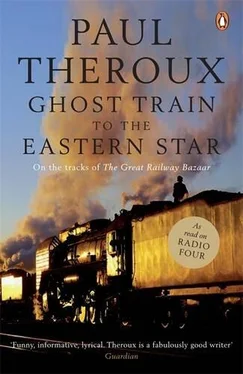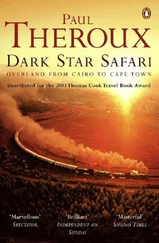Paul Theroux
Ghost Train to the Eastern Star
YOU THINK of travelers as bold, but our guilty secret is that travel is one of the laziest ways on earth of passing the time. Travel is not merely the business of being bone-idle, but also an elaborate bumming evasion, allowing us to call attention to ourselves with our conspicuous absence while we intrude upon other people's privacy — being actively offensive as fugitive freeloaders. The traveler is the greediest kind of romantic voyeur, and in some well-hidden part of the traveler's personality is an unpickable knot of vanity, presumption, and mythomania bordering on the pathological. This is why a traveler's worst nightmare is not the secret police or the witch doctors or malaria, but rather the prospect of meeting another traveler.
Most writing about travel takes the form of jumping to conclusions, and so most travel books are superfluous, the thinnest, most transparent monologuing. Little better than a license to bore, travel writing is the lowest form of literary self-indulgence: dishonest complaining, creative mendacity, pointless heroics, and chronic posturing, much of it distorted with Munchausen syndrome.
Of course, it's much harder to stay at home and be polite to people and face things, but where's the book in that? Better the boastful charade of pretending to be an adventurer:
Yes, swagger the nut-strewn roads,
Crouch in the fo'c'sle
Stubbly with goodness,
in a lusty "Look-at-me!" in exotic landscapes.
This was more or less my mood as I was packing to leave home. I also thought: But there is curiosity. Even the most timid fantasists need the satisfaction of now and then enacting their fantasies. And sometimes you just have to clear out. Trespassing is a pleasure for some of us. As for idleness, "An aimless joy is a pure joy."
And there are dreams: one, the dream of a foreign land that I enjoy at home, staring east into space at imagined temples, crowded bazaars, and what V. S. Pritchett called "human architecture," lovely women in gauzy clothes, old trains clattering on mountainsides, the mirage of happiness; two, the dream state of travel itself. Often on a trip, I seem to be alive in a hallucinatory vision of difference, the highly colored unreality of foreignness, where I am vividly aware (as in most dreams) that I don't belong; yet I am floating, an idle anonymous visitor among busy people, an utter stranger. When you're strange, as the song goes, no one remembers your name.
Travel can induce such a distinct and nameless feeling of strangeness and disconnection in me that I feel insubstantial, like a puff of smoke, merely a ghost, a creepy revenant from the underworld, unobserved and watchful among real people, wandering, listening while remaining unseen. Being invisible — the usual condition of the older traveler — is much more useful than being obvious. You see more, you are not interrupted, you are ignored. Such a traveler isn't in a hurry, which is why you might mistake him for a bum. Hating schedules, depending on chance encounters, I am attracted by travel's slow tempo.
Ghosts have all the time in the world, another pleasure of long-distance aimlessness — traveling at half speed on slow trains and procrastinating. And this ghostliness, I was to find, was also an effect of the journey I had chosen, returning to places I had known many years ago. It is almost impossible to return to an early scene in your traveling life and not feel like a specter. And many places I saw were themselves sad and spectral, others big and hectic, while I was the haunting presence, the eavesdropping shadow on the ghost train.
***
LONG AFTER I TOOK the trip I wrote about in The Great Railway Bazaar I went on thinking how I'd gone overland, changing trains across Asia, improvising my trip, rubbing against the world. And reflecting on what I'd seen — the way the unrevisited past is always looping in your dreams. Memory is a ghost train too. Ages later, you still ponder the beautiful face you once glimpsed in a distant country. Or the sight of a noble tree, or a country road, or a happy table in a café, or some angry boys armed with rusty spears shrieking, "Run you life, dim-dim! " — or the sound of a train at night, striking that precise musical note of train whistles, a diminished third, into the darkness, as you lie in the train, moving through the world as travelers do, "inside the whale."
Thirty-three years went by. I was then twice as old as the person who had ridden those trains, most of them pulled by steam locomotives, boiling across the hinterland of Turkey and India. I loved the symmetry in the time difference. Time passing had become something serious to me, embodied in the process of my growing old. As a young man I regarded the earth as a fixed and trustworthy thing that would see me into my old age; but older, I began to understand transformation as a natural law, something emotional in an undependable world that was visibly spoiled. It is only with age that you acquire the gift to evaluate decay, the epiphany of Wordsworth, the wisdom of wabi-sabi: nothing is perfect, nothing is complete, nothing lasts.
"Without change there can be no nostalgia," a friend once said to me, and I realized that what I began to witness was not just change and decay, but imminent extinction. Had my long-ago itinerary changed as much as me? I had the idea of taking the same trip again, traveling in my own footsteps — a serious enterprise, but the sort of trip that younger, opportunistic punks often take to make a book and get famous.*
*The list is very long and includes travelers' books in the footsteps of Graham Greene, George Orwell, Robert Louis Stevenson, Leonard Woolf, Joseph Conrad, Mr. Kurtz, H. M. Stanley, Leopold Bloom, Saint Paul, Basho, Jesus, and Buddha.
The best of travel seems to exist outside of time, as though the years of travel are not deducted from your life. Travel also holds the magical possibility of reinvention: that you might find a place you love, to begin a new life and never go home. In a distant place no one knows you — nearly always a plus. And you can pretend, in travel, to be different from the person you are, unattached, enigmatic, younger, richer or poorer, anyone you choose to be, the rebirth that many travelers experience if they go far enough.
The decision to return to any early scene in your life is dangerous but irresistible, not as a search for lost time but for the grotesquerie of what happened since. In most cases it is like meeting an old lover years later and hardly recognizing the object of desire in this pinched and bruised old fruit. We all live with fantasies of transformation. Live long enough and you see them enacted — the young made old, the road improved, houses where there were once fields; and their opposites, a good school turned into a ruin, a river poisoned, a pond shrunk and filled with trash, and dismal reports: "He's dead," "She's huge," "She committed suicide," "He's now prime minister," "He's in jail," "You can't go there anymore."
A great satisfaction in growing old — one of many — is assuming the role of a witness to the wobbling of the world and seeing irreversible changes. The downside, besides the tedium of listening to the delusions of the young, is hearing the same hackneyed opinions over and over, not just those of callow youth but, much worse and seemingly criminal, the opinions of even callower people who ought to know better, all the lies about war and fear and progress and the enemy — the world as a wheel of repetition. They — I should say "we" — are bored by things we've heard a million times before, books we've dismissed, the discoveries that are not new, the proposed solutions that will solve nothing. "I can tell that I am growing old," says the narrator in Borges's story "The Congress." "One unmistakable sign is the fact that I find novelty neither interesting nor surprising, perhaps because I see nothing essentially new in it — it's little more than timid variations on what's already been."
Читать дальше












